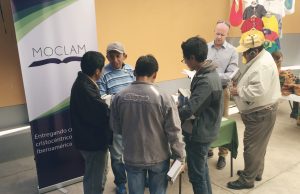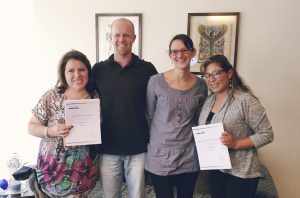Deep roots for a growing church
CMS missionaries Adrian and Anita Lovell have been serving with MOCLAM, a theological training program for Spanish-speaking Christians, for over a decade. Anita explains the vision for MOCLAM and its significance in offering training in biblical theology in Spanish.
Over the past four decades, MOCLAM has provided high quality theological training by distance learning to Spanish-speaking students from 22 countries. In the last year alone, we’ve had 830 enrolments.
Translated from Moore Theological College courses, the MOCLAM program was developed to make a robustly biblical, Christ-centred educational tool available to Christians in the Spanish-speaking world. As people studied the first subjects translated from Moore’s distance-learning courses, word spread fast—in a way that bore testimony to the void MOCLAM was filling.
The big picture
What makes MOCLAM unique? How can a course originally written in English for lay leaders in Sydney help the Bolivian missionary? Or the student worker in Mexico? Or the bi-vocational pastor in Peru? Or the Sunday School teacher in Chile? Or the pastor’s wife in Argentina? Or the Christian journalist in Spain?
The foundational subject that MOCLAM offers is De Creación a Nueva Creación (‘Creation to New Creation’). This subject explains how God’s salvation plan develops throughout the whole Bible, with Jesus at the centre. It also touches on how we can use this framework to interpret and apply the Bible. Perhaps this sounds like bread and butter to the average evangelical in Australia, but we know of no other course like it in the Spanish-speaking world.
One student says:
“Many people have a fragmented perspective of the Bible, which brings confusion and little clarity to be able to see Jesus and respond to him in faith. The MOCLAM courses are so good at teaching and strengthening a theology that is biblical, unified, and Christ-centred, enabling a response in faith to the promises of God, centred on Jesus.”
Biblical theology is the foundation for all the MOCLAM courses. After the first MOCLAM subject many students continue studying and will often complete their Certificado Preliminar de Teología (Preliminary Theological Certificate, PTC) by studying Old Testament 1, New Testament 1, Doctrine 1, Ephesians and Christian Worship. Following the PTC (six subjects), we offer an Intermediate Certificate (for completion of a further six subjects) and a Certificate in Theology (once students have completed all 18 MOCLAM subjects).
Understanding Jesus as the interpretive key to reading the Bible is revolutionary for many Spanish-speaking Christians. Seeing the beauty of the gospel in the context of biblical theology frees people from legalism, and sparks the desire to learn more and share it with others.
After completing her PTC, Patricia from Spain said:
“Now I’m better prepared to preach the good news to those around me and tell them why I am so happy following Jesus.”
The value of MOCLAM now
MOCLAM is playing an important role as the theological education scene continues to evolve. It does this in three key ways:
1. Equipping Christian workers
Having access to a course in Spanish that’s both affordable and comprehensive enables many Christian workers to be equipped in biblical theology. Marcelo, a pastor from Bolivia says:
“For my pastoral ministry, the main value of being equipped with MOCLAM is to grow in my understanding of the broader Bible narrative, which revolves around Christ, and …to be able to help other people in my church to see the Bible in that way too, as one unified story, with Jesus at the centre.”

A MOCLAM bookstall.
2. Complementing further study
For the well-resourced Christian or for those with access to sponsorship, there’s now a plethora of training options through institutions in Spain, Latin America or the USA. Yet even those students recognise the need for a biblical theology framework. Some study MOCLAM subjects alongside a theological degree elsewhere.
Juan André from Perú is studying MOCLAM alongside a Masters of Divinity. He says:
“MOCLAM offers courses with a strong biblical theology component, which unifies them. In other institutions Biblical Theology is just one subject, and it isn’t necessarily covered in the other subjects.”
Other MOCLAM students are encouraged to embark on further study, so we’re developing a more advanced course, based on Moore’s Diploma of Biblical Theology, translated into Spanish. Daniel, in Mexico, says:
“The MOCLAM courses provide a solid foundation for Christ-centred interpretation, which is vital for the study of any theological subject.”

Adrian and Anita with the first two Bolivian MOCLAM graduates in 2016.
3. Denominational partnerships
The evangelical church has grown in Latin America, with much enthusiasm and many denominational expressions, often out-pacing the training of its leaders. MOCLAM appeals to these denominations, offering something clear and comprehensive that delves deeper than other courses.
The director of the Instituto Teológico Reformado (Reformed Theological Institute) in Chile says:
“We want our institute to be known for biblical theology and apart from MOCLAM there are not many other resources available to use in Spanish. MOCLAM is known for biblical theology and so we want to make use of that material so our students can think and teach this way in their ministries.”
Some students are given credit for their MOCLAM studies within their denominational qualification structures.

A group of Bolivian MOCLAM students.
The next four decades?
Spanish is the fourth-most spoken language in the world. MOCLAM’s vision is to train Spanish-speaking Christians to read, interpret and explain any Bible passage Christocentrically. We want our courses to be readily available, with a high quality of translation, design, contextualisation, and evaluation, and academically appropriate for as many as possible.
This is not a small vision! It will require a team of missionaries who themselves have an advanced grasp of the Spanish language, developing deep relationships and profound cultural insights to understand how MOCLAM can best serve the church. It will require a significant investment of time and money to develop the courses. It will require prayer. Will you join us in asking our generous and good God that this ministry would bear fruit for his kingdom?

GO
MOCLAM needs a growing team to develop and expand its offer of theological courses for Spanish-speaking Christians. Is this something you could help with? Contact your CMS branch to find out more about how you might get involved.












































































































